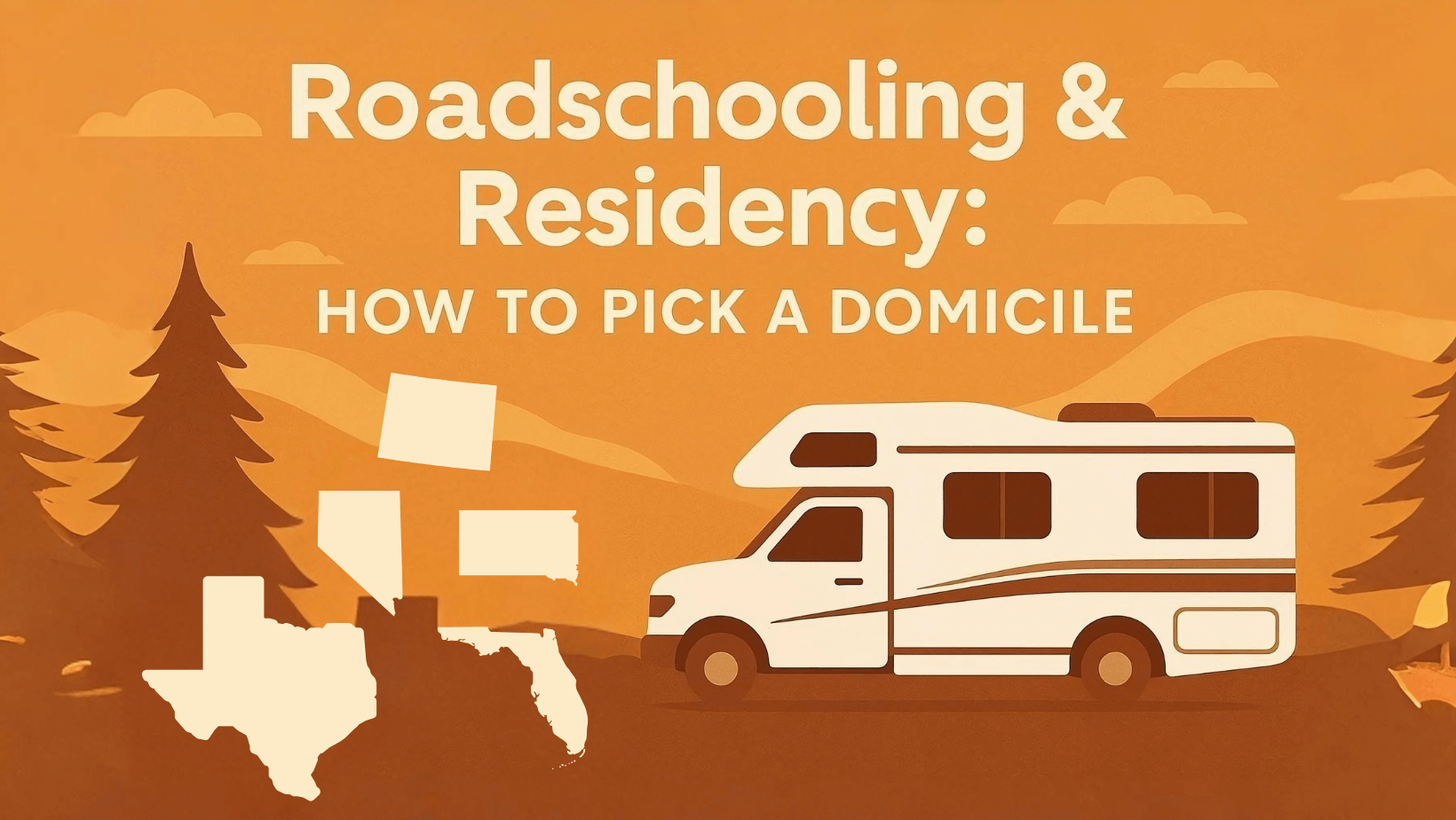ROADSCHOOLING & RESIDENCY: HOW TO PICK A DOMICILE
Created by: Chris Cox
Roadmap To Residency
When you decide to hit the road full-time, there’s more to think about than where to park your RV. If you’re planning to roadschool your kids, your domicile — your legal state of residency — will shape everything from your taxes to your homeschooling requirements.
For many RV families, choosing a domicile is a financial and educational decision. For us at 4C’s in an RV, the choice came down to more than convenience or tax savings — it was about preserving educational benefits for our daughters. While many travelers switch to a “domicile-friendly” state, we chose to remain North Carolina residents because of its veteran education benefits and our long-term plan to return home.
Table of Contents
What Is a Domicile and Why It Matters
Your domicile is your legal home state — the one that determines:
Where you pay state taxes (if any)
Your driver’s license and vehicle registration
Voting registration
Jury duty obligations
Homeschooling laws you must follow
For roadschooling families, your domicile state’s homeschool statutes will dictate record-keeping, testing, and curriculum flexibility.
State Statutory Requirements for Homeschooling
Each state has its own rules for homeschooling. Some are very relaxed, while others have stricter oversight. Requirements may include:
Notice of Intent to homeschool
Record-keeping (attendance, portfolios, work samples)
Standardized testing or evaluations
Teacher qualifications (some states require parents to have a diploma or specific credentials)
You can find detailed homeschool laws for each state through the Homeschool Legal Defense Association (HSLDA) and National Home Education Research Institute.
Top 5 Domicile States for Full-Time RV Families
While you can choose any state to keep as your domicile, most full-time RVers choose one of these five for tax advantages and residency ease:
1. Texas
Pros: No state income tax, easy vehicle registration, friendly homeschool laws, and large RV community.
Cons: Vehicle inspections required if you return to Texas, higher vehicle insurance in some regions.
Homeschool Law: Very relaxed; homeschools are considered private schools.
2. Florida
Pros: No state income tax, simple mail forwarding options, affordable insurance for many.
Cons: Requires annual homeschool evaluation or standardized testing.
Homeschool Law: Must file Notice of Intent; annual evaluation by certified teacher or testing required.
3. South Dakota
Pros: No state income tax, easy residency setup (can be done in 24 hours), low insurance rates.
Cons: Fewer in-state services for RVers compared to Texas/Florida.
Homeschool Law: Annual standardized testing required for certain grades.
4. Nevada
Pros: No state income tax, low vehicle registration fees, minimal homeschool oversight.
Cons: Vehicle insurance can be high in urban counties.
Homeschool Law: File a one-time Notice of Intent; no annual reporting required.
5. Wyoming
Pros: No state income tax, low cost of living, light homeschool regulations.
Cons: Fewer mail forwarding and RV-specific services.
Homeschool Law: Submit annual curriculum outline to district; otherwise minimal oversight.
Why We Stayed in North Carolina
While North Carolina isn’t on the “big five” list, it was the right choice for our family. As a veteran with a VA disability rating, I qualify for North Carolina’s educational benefits for dependents, which provide tuition waivers at public colleges and universities for eligible children. We didn’t want to risk losing that for our girls.
Homeschool in NC:
File a Notice of Intent.
Maintain attendance records and immunization records.
Administer a standardized test annually and keep results on file.
More info: NC Department of Administration: Division of Non-Public Education.
How to Change Your Domicile
If you decide to switch states:
Choose a mail forwarding service in your new state (e.g., Escapees RV Club, Americas Mailbox, or St. Brendan’s Isle).
*Note: Harvest Hosts acquired Escapees in 2024, so if you have a Harvest Host membership, it now has additional benefits.
Get a new driver’s license and register your vehicles.
Register to vote in your new state.
Update your address with banks, insurance, IRS, and legal documents.
Follow your new state’s homeschool registration process.
Homeschool, Roadschool, and Worldschool Methods
Whether you stay in one state or travel the globe, there are different approaches to homeschooling:
Classical: Literature-heavy, three-stage learning model (grammar, logic, rhetoric).
Charlotte Mason: Focus on “living books,” nature study, short lessons.
Unschooling: Child-led learning with no set curriculum.
Eclectic: Mix of multiple methods tailored to the child.
Unit Studies: Thematic, multi-subject approach to a single topic.
Most roadschoolers, to include us, use an eclectic approach, blending structured lessons with travel-based, hands-on learning.
Resources:
HSLDA – Legal homeschool info by state
Worldschooling Central – Community for global learners
The Homeschool Mom – Planning tools & curriculum reviews
Free Resource For Roadschooling Families
Changing your domicile while roadschooling doesn’t have to be overwhelming — you just need a clear plan. That’s why we created the Changing Your Domicile as a Roadschooler – Checklist. It’s a step-by-step guide to help you research, prepare, and complete the process with confidence.
📥 Click here to download your free checklist and start your domicile transition the right way.
Final Thoughts
Choosing a domicile as a roadschooling family isn’t just about taxes — it’s about aligning your legal residency with your educational goals, long-term plans, and lifestyle. Whether you go for one of the big five RV states or keep your home-state ties like we did, take time to research your options, understand homeschool laws, and plan the transition carefully.
At the end of the day, the right domicile supports both your travels and your children’s education — and that’s worth the paperwork.
Join Our Journey 🚐
To receive additional travel tips and information about life on the road from 4C’s in an RV, subscribe below!
